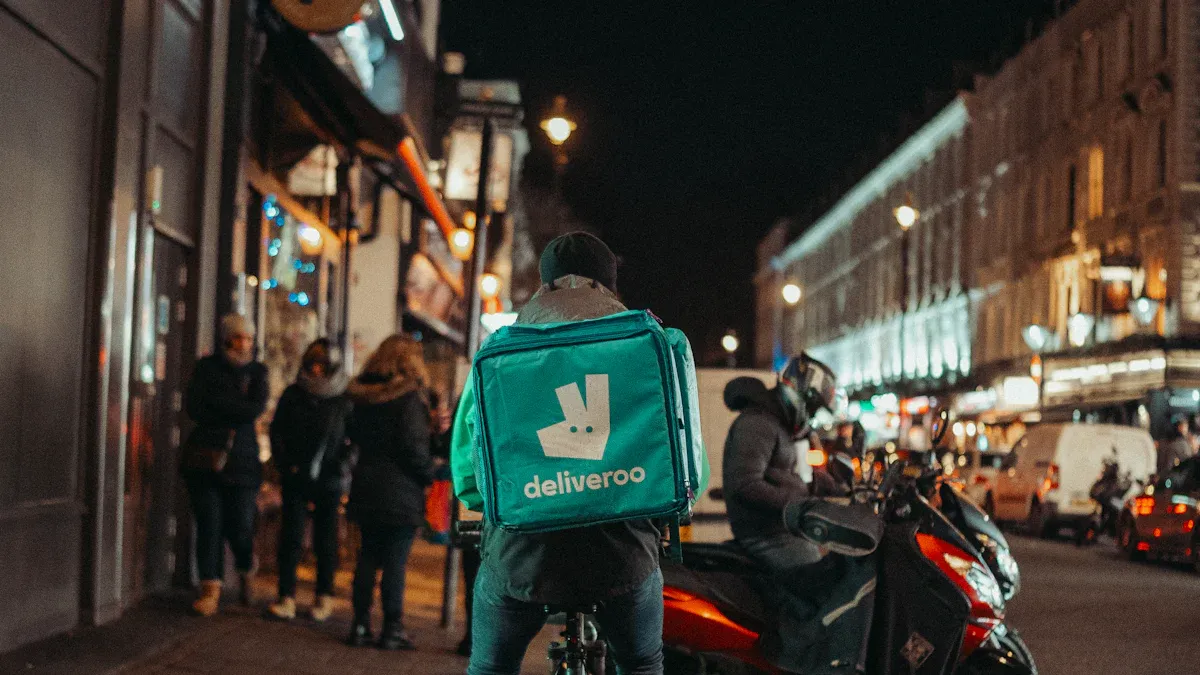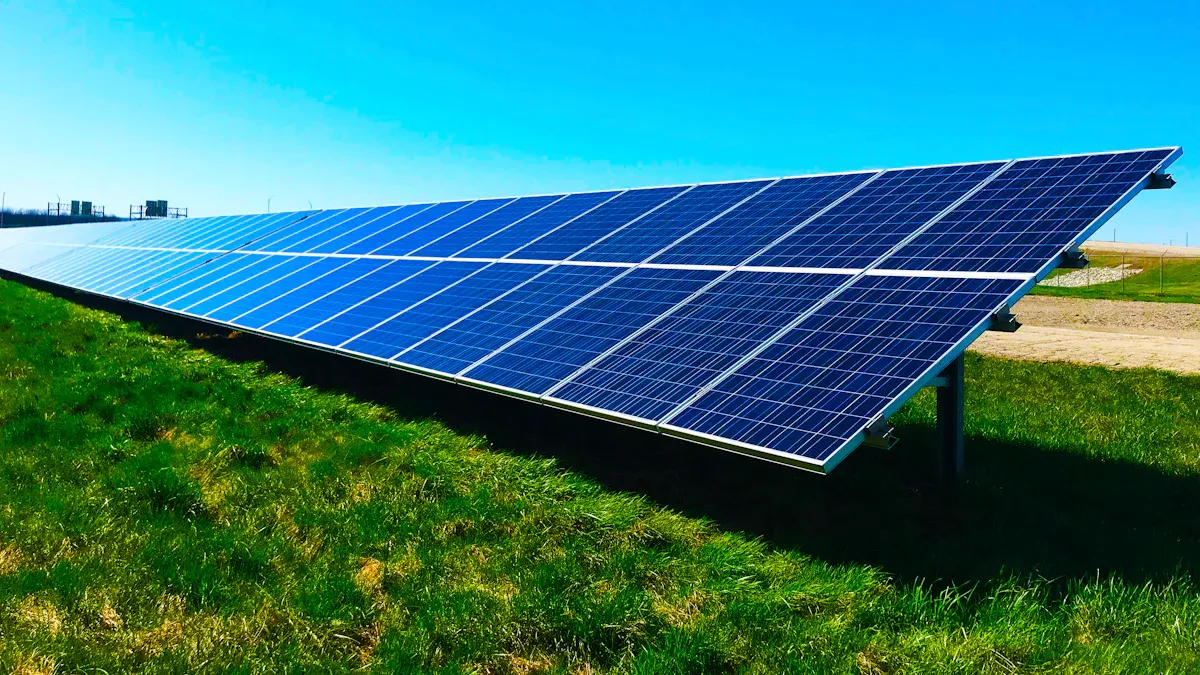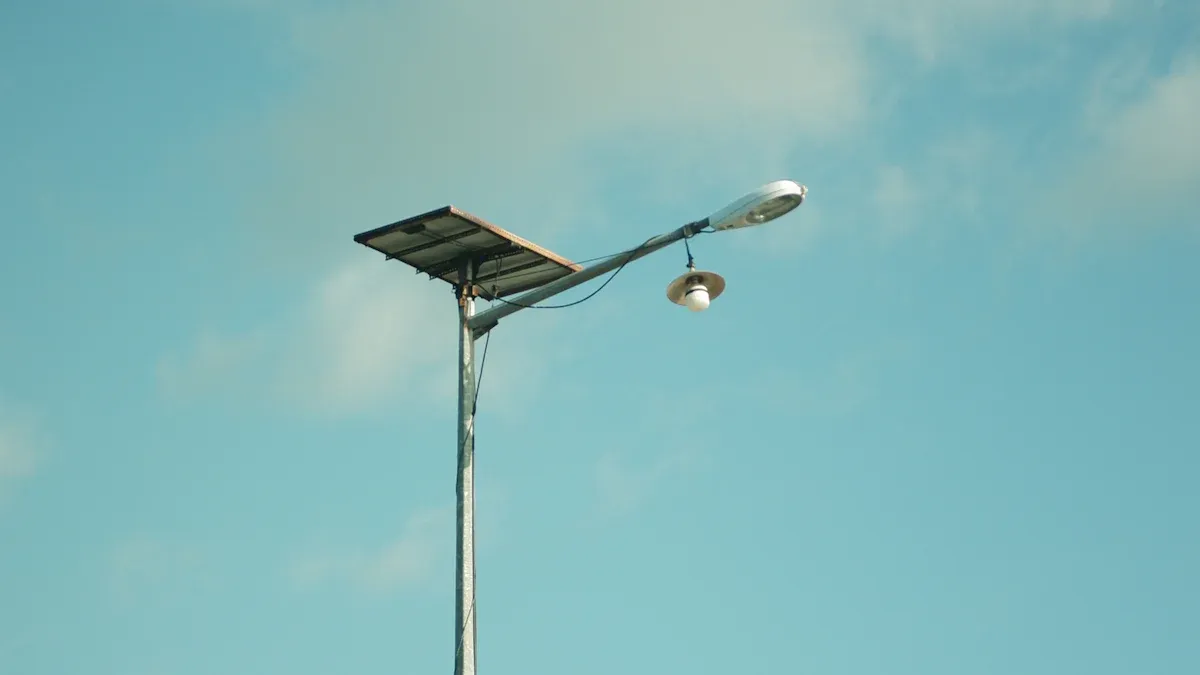
When someone needs solar lights fast, every day counts. Reliable suppliers use express couriers like FedEx or DHL Express, which deliver in two to seven business days in the US and Europe. Check out the table below for common shipping options:
| Shipping Method | Delivery Time (US & Europe) | Notes |
|---|---|---|
| Airfreight | 3-7 business days | Good for urgent orders |
| FedEx / UPS / DHL Express | 2-7 business days | Fastest for emergencies |
| USPS Priority Mail | 3-7 business days | Fast and steady |
| Ocean Freight | 25-34 days | Too slow for urgent needs |
| Warehouses Location | US or Europe | Closer inventory, quicker shipping |
Key Takeaways
- Choose suppliers with fast shipping options like express couriers and warehouses near your location to get solar lights quickly.
- Check supplier credentials, certifications, and stock availability before ordering to ensure reliable and timely delivery.
- Follow shipping rules carefully, especially for lithium batteries, and keep all documents accurate to avoid delays and fines.
Choosing Reliable Solar Lights Suppliers for Urgent Orders

Where to Find Fast-Shipping Solar Lights Suppliers
Finding a supplier who can deliver solar lights quickly can feel overwhelming, but several trusted sources make the process easier. Many buyers start their search online. Platforms like HappyLightTime offer wholesale and OEM solutions for solar lights, with catalogs and direct contact options for fast inquiries. Onforu LED stands out as a factory-direct supplier with a U.S. warehouse, which means they can ship solar lights quickly within the country. Their website lists a wide range of products, secure payment methods, and a two-year warranty. Buyers can also reach out through their social media channels for quick responses.
Offline, trade fairs and industry expos provide a chance to meet suppliers face-to-face. These events often feature major manufacturers from the Asia Pacific region, especially China, which leads the global market in solar lights production and fast shipping. Companies like Sungold Solar, with factories in Shenzhen and Indonesia, show how this region combines strong manufacturing with efficient logistics. North America and Europe also have reliable suppliers, but Asia Pacific remains the top choice for urgent orders due to its large manufacturing base and quick shipping options.
Criteria for Selecting Trustworthy Solar Lights Partners
Choosing the right supplier for urgent solar lights orders means looking beyond just price. Industry experts recommend several key criteria:
- Understand the basics of solar lights, such as solar panel wattage, LED chip brand, battery type, and controller features. This knowledge helps buyers judge product quality.
- Check the supplier’s credentials. Look for certifications like ISO 9001, CE Marking, RoHS, and IP ratings. These show the supplier meets international standards and can deliver reliable products.
- Review past projects and warranty terms. Suppliers who offer clear warranties and have a history of successful deliveries are more likely to handle urgent orders well.
- Start with a small trial order. This reduces risk and helps build trust before placing a large urgent order.
- Plan shipping carefully, especially when lithium batteries are involved. Suppliers should provide all required safety documents and follow shipping regulations.
- Use reliable sourcing platforms like Google, Alibaba, and trade fairs. These help verify supplier authenticity and ensure timely delivery.
- Maintain clear communication with the supplier and shipping agent. This helps prevent delays and ensures everyone understands the shipping plan.
Tip: Always check customer reviews and third-party certifications. These add another layer of trust and help buyers avoid unreliable suppliers.
Verifying Stock and Shipping Commitments for Solar Lights
When time is tight, buyers need to confirm that suppliers have solar lights in stock and can ship on schedule. Real-time inventory management tools, like Dhyan’s LightMan Smart Lighting Management Software, allow suppliers to track stock levels and monitor shipments across multiple sites. Some suppliers use IoT technology, such as the Ohli Helio system, to provide remote monitoring and instant updates on inventory.
Buyers should also ask for shipment tracking numbers and regular status updates. If a supplier cannot ship on time, buyers can request refunds to enforce commitments. For ocean shipments, buyers can track vessels using websites like MarineTraffic. It helps to build relationships with suppliers who have a proven record of on-time shipping.
Contractual agreements play a big role in urgent orders. The table below shows how contracts help ensure shipping commitments:
| Contractual Element | Description | Impact on Shipping Commitments |
|---|---|---|
| Payment Terms | Deposits or full payment before shipment | Ensures financial commitment and prevents shipment delays |
| Lead Times & Approvals | Shipments depend on timely approvals and payments | Encourages buyers to meet deadlines to avoid delays |
| Shipping Terms | Title passes on loading; buyer handles insurance and claims | Defines risk transfer and encourages prompt shipment acceptance |
| Accelerated Schedules | Fast-track options available at extra cost | Allows buyers to expedite urgent orders |
Good suppliers keep buyers informed about shipment progress and respond quickly to questions. Buyers should inspect goods upon arrival and communicate any issues right away. This approach helps avoid surprises and builds a strong, reliable supply chain for urgent solar lights orders.
Managing Shipping Logistics for Fast Solar Lights Delivery

Shipping Methods and Timelines for Solar Lights
Getting solar lights delivered quickly depends on choosing the right shipping method and understanding what can slow things down. Express couriers like FedEx, UPS, and DHL offer the fastest options, often delivering in two to seven business days. Airfreight is another speedy choice, usually taking three to seven business days. These methods work well for urgent orders, but several factors can still cause delays.
Here are some common reasons why express and air freight shipments might get held up:
| Factor | Explanation |
|---|---|
| Customs Processing | Incomplete paperwork or mistakes can lead to inspections and extra questions from customs. |
| Regional Holidays | Public holidays at the origin or destination can slow down courier schedules and increase volume. |
| Remote Areas | Deliveries to rural or hard-to-reach places take longer and may cost more. |
| Weather Conditions | Bad weather can stop flights or trucks, causing unavoidable delays. |
| Transit Hubs and Routing | Problems at busy transit hubs can add extra days to delivery. |
| Security Checks | Extra screenings for certain items or regions can delay shipments by one or two days. |
| Incorrect Address/Contact | Wrong details mean failed deliveries and more waiting. |
| Courier Capacity Peak Seasons | Busy times like Black Friday can overload courier networks. |
Tip: Double-check all shipping documents and addresses before sending out urgent solar lights orders. This simple step can prevent many common delays.
Customs inspections also play a big role. Shipments may go through different levels of checks, from a quick X-ray scan to a full container inspection. Each level adds time and sometimes extra fees. Planning for these possibilities helps keep urgent deliveries on track.
Handling Lithium Battery Regulations in Solar Lights Shipments
Most solar lights use lithium batteries, which are considered dangerous goods. Shipping these batteries requires following strict rules. Air freight is the fastest way to ship, but it comes with the toughest regulations. Airlines follow the IATA Dangerous Goods Regulations, which set limits on how much lithium battery material can go in each package and require special labels and paperwork.
Here’s a quick look at how lithium battery shipments are classified:
| Shipment Type | Lithium Ion Battery UN Number | Lithium Metal Battery UN Number | Packaging Instruction (PI) |
|---|---|---|---|
| Standalone (batteries only) | UN3480 | UN3090 | PI 965 (Li-ion), PI 968 (Li-metal) |
| Packed with Equipment (not installed) | UN3481 | UN3091 | PI 966 (Li-ion), PI 969 (Li-metal) |
| Contained in Equipment (installed) | UN3481 | UN3091 | PI 967 (Li-ion), PI 970 (Li-metal) |
Since 2022, airlines have removed some exceptions for standalone lithium batteries. Now, every shipment must have the right labels, a shipper’s declaration, and trained staff handling the process. Packages must not exceed certain weight limits—10 kg for lithium ion and 2.5 kg for lithium metal. Labels like the Class 9 lithium battery label and “Cargo Aircraft Only” are required.
- Lithium batteries are Class 9 dangerous goods. They need secure packaging, clear labeling, and must stay away from heat sources.
- Air freight has the strictest rules, which can make urgent shipping more complicated.
- Ocean, road, and rail transport have their own rules, but air is usually the fastest for urgent needs.
Note: Breaking these rules can lead to big fines—up to $79,976 per day for first-time violations. If a violation causes harm or damage, the fine can jump to $186,610. Repeat or serious violations may even lead to criminal charges.
Documentation and Compliance for International Solar Lights Orders
Shipping solar lights internationally means dealing with lots of paperwork and following different rules for each country. For shipments with lithium batteries, the paperwork gets even more important. Shippers must include:
- A lithium battery shipping declaration
- Material Safety Data Sheet (MSDS)
- Dangerous Goods Shipper’s Declaration (when needed)
- Proper labels with hazard warnings and the correct UN numbers
Packages must follow IATA Packing Instructions 965-970, depending on how the batteries are packed. The shipper is responsible for making sure all documents are correct. Mistakes can lead to legal trouble and delays.
Customs clearance adds another layer. In the United States, new rules mean even shipments under $800 may need formal entry and extra paperwork. Customs officers now check low-value shipments more closely, especially for solar and electronic products. Missing or incorrect importer identification numbers can slow things down. In Europe and Australia, shipments must meet local safety and environmental standards, like CE marking, RoHS, and SAA certification.
| Region | Mandatory Certifications | Focus and Requirements |
|---|---|---|
| United States | UL, FCC | UL checks safety and reliability; FCC checks for radio interference. |
| Europe | CE, RoHS, ENEC, GS, VDE, ErP, UKCA | Covers safety, hazardous substances, energy efficiency, and more. |
| Australia | SAA | Ensures products meet Australian safety standards. |
To speed up customs clearance, many companies use these best practices:
- Pick branded components that already have approvals, like Philips LED chips or TIER-1 panels.
- Schedule witness tests only for the final assembly to save time and money.
- Bundle certification documents for multiple markets by starting with base certifications and adding local templates.
- Lock the bill of materials so changes don’t mess up certifications.
Callout: Following these steps has helped some companies cut customs clearance times from seven days to just two.
Staying organized with documentation and compliance helps urgent solar lights shipments move faster and avoids costly mistakes.
To guarantee fast shipping and a reliable supply chain for urgent solar lights orders, companies should:
- Choose suppliers with proven quick-ship programs.
- Plan logistics early and keep communication open.
- Use flexible delivery options and backup plans.
A strong supply chain helps solar lights reach customers quickly and supports long-term business growth.
FAQ
How fast can suppliers ship solar lights for urgent orders?
Most suppliers ship within 24 to 48 hours if products are in stock. Express couriers deliver in two to seven business days.
What documents do buyers need for international solar lights shipments?
Buyers need a commercial invoice, packing list, and shipping labels. For lithium batteries, they also need a Dangerous Goods Declaration and safety data sheet.
Can buyers track their solar lights shipment in real time?
Yes! Most suppliers provide tracking numbers. Buyers can check shipment status online or ask the supplier for updates.
Post time: Jul-14-2025
